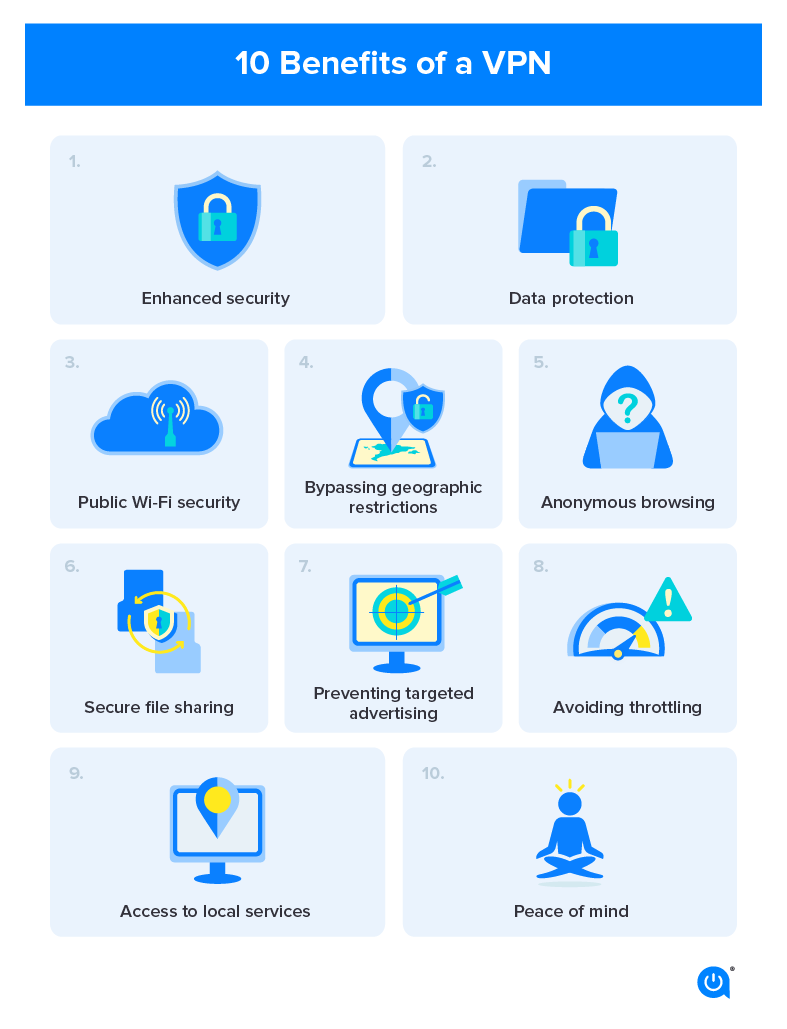If you’re often on the go, using a VPN can provide secure and reliable internet access – especially when you visit an international destination. Websites you rely on, including social media, could be restricted in other countries. And counting on public Wi-Fi can lead to unexpected downtime or insecure connections. Digital nomads often use a VPN to stay online. Not only does a VPN hide your IP address for security, but it tunnels your data through a private encrypted channel that allows you to access otherwise blocked sites.
Finding the best VPN to use for travel is a lot easier now that we’ve done the research for you. Check out four of the best VPN services, including VPNs for Europe and international travel.
How does a VPN work?
Using a VPN is an easy way for you to protect your internet traffic. When you connect to a VPN, your internet traffic is rerouted through an encrypted service, keeping you anonymous and blocking anyone from seeing what you’re doing on the internet by hiding your IP address.

Importance of VPNs for traveling
When you’re traveling, you won’t be connected to your home or work network. Instead, you’re often connected to unprotected public networks (networks at cafes, train stations, airports, hotels, etc.) that don’t have any significant security measures in place. This means all of your internet activity is out in the open for anyone to see.
Using a VPN while traveling prevents users from stealing your data, passwords, credit card numbers or other important personal information that is visible to those public networks.
Why not use a public Wi-Fi network?
Like we mentioned above, when you use a public Wi-Fi network, outside entities can view your internet activity and potentially steal significant personal information. When you’re traveling, this is even more of a risk since you’re constantly connecting to these public networks instead of your home or work network.
The best VPNs for traveling
| VPN | ExpressVPN | NordVPN | Surfshark | IPVanish |
|---|---|---|---|---|
| Best for | Overall security | Consistency | Budget friendly | Unlimited connections |
| Price | $6.67/mo. | $3.29/mo. | $2.80/mo. | $3.33/mo. |
| Features | Rated the best VPN across multiple lists, more than 3,000 servers, servers located in 94 countries. | 30-day money back guarantee, free trial, 5,000+ servers in 60 countries. | Unlimited connections, free trial, antivirus software, more that 3,200 servers in 100 countries. | Highly configurable, user-friendly, 2,000+ servers in over 75 countries. |
| Free versions | No | No | No | Yes |
| Simultaneous connections | 5 | 6 | Unlimited | Unlimited |
All VPNs have some things in common: they route your data through a private server, hide your activity from other entities and keep you fairly anonymous online. But the best VPNs can do more than that. You also want to look for a good price, top-notch security and a contract period that works for you. Many VPNs require you to sign long-term contracts to get the best price. We chose the best VPNs to use for travel based on a variety of factors, including how many servers are available and their level of security.
Our methodology
We evaluated VPNs based on factors related to function, security and price. To determine the best VPNs to use for travel, we expected providers to offer service that is affordable and able to be used from multiple locations (including VPN for Europe) on iOS, Windows and Android devices. We also evaluated expert opinions, security reputation, number of servers used, available speeds and customer reviews.

Best VPN for traveling for overall security: ExpressVPN
ExpressVPN is routinely complimented for its commitment to security, which includes VPN split tunneling, network lock kill switch, AES-256 encryption, private DNS on every server and no activity logs. While there is no free version, the price breaks down to just under $7/mo. if you pay for an annual plan at the same time. On the downside, this VPN is a bit more expensive than other options. If you’re not using it for international travel you may feel like you’re paying for advanced features you don’t utilize. On the upside, you have the extra security on hand if you ever decide to go abroad.
ExpressVPN has a 4.7/5 star customer rating on Trustpilot.
Best for budget-friendly service: Surfshark
Surfshark VPN is our choice for the best affordable VPN. It has over 3,200 servers in 100 countries and unlimited simultaneous connections. Surfshark is very affordable at less than $3/mo., and has private DNS capabilities and antivirus software.
Some other features include 24/7 customer support, two-factor authentication, unlimited devices and a cookie pop-up blocker. Surfshark VPNVyprVPN has a rating of 4.5/5 stars from customers on Trustpilot.
Best for consistency: NordVPN
NordVPN is a reliable choice for a travel VPN which is why we picked it as the best VPN for consistency. Wherever you’re connecting from, NordVPN will have you covered. It has a large server network with over 5,000 servers in 60 countries. It also allows for six simultaneous connections and is less than $4/mo.
On the downside, NordVPN doesn’t have unlimited connections like Surfshark and IPVanish but does have 4.4 stars on Trustpilot.
Best for unlimited connections: IPVanish
IPVanish has over 2,000 servers in over 75 countries. It has unlimited simultaneous connections, fast connection types and is highly configurable. It’s a great choice for traveling because you can choose the best server based on your current location.
While it has slower download speeds, its customizable settings and unlimited connections make it a desirable choice for travel VPNs. IPVanish has 4.4/5 stars on Trustpilot.
What are the limitations of virtual private networks?
While a VPN hides your location and activity from your internet provider and other outside sources, you can’t be completely hidden. Your VPN provider has access to your data. And some may even sell your data to other sources. And you’re still vulnerable to ransomware and other online threats, even with the best VPN to use for travel. Finally, because your data is bouncing from a server that is often far away, you always lose some speed.
How to set up your VPN
Most VPN companies provide step-by-step instructions when you sign up. For some general instructions about how to get started with a VPN on your device (such as a laptop or phone), consider the following:
- Sign up for a VPN to create a login and password.
- Download the company’s app, either from a mobile app store or the company website.
- Enter your login information on the app.
- Wait for the service to locate the VPN server closest to you.
- If it’s allowed, choose the server location you want the company to use.
- Go online. Your data is now being funneled through the VPN pipeline.
Travel VPN FAQs
A VPN helps hide your activity, but it does not provide internet. You will need to log on to an internet provider before you can use a VPN. However, you can feel safer on public Wi-Fi once you run a VPN, because your data and IP address will be hidden. Check out our guide to help determine the best internet options for traveling.
Using a VPN is legal in most places, including the U.S. If you are traveling to another country, make sure you know the law before using a VPN.
A VPN creates a private network for your device. If internet data is typically a river, your data goes through a steel pipe instead. No one can see what is inside or where it came from. Only the two parties on either side of the pipe (you and the server) know the origins and contents. Your VPN hides your IP address and it appears as if your activity is taking place in the location of the server.
Allconnect: Let us compare providers for you
Why should you choose Allconnect? We’re the #1 broadband marketplace in the U.S, meaning you can trust us to search, compare and order internet and TV service for your home.
Get started
Written by:
Robin LaytonEditor, Broadband Content
Robin Layton is an editor for the broadband marketplace Allconnect. She built her internet industry expertise writing and editing for four years on the site, as well as on Allconnect’s sister site MYMOVE.com. …
Read more

Edited by:
Joe SupanPrincipal Writer, Broadband Content
-
Featured
![Step-by-step guide on how to set up a VPN]() Step-by-step guide on how to set up a VPN Taylor Gadsden — 4 min read
Step-by-step guide on how to set up a VPN Taylor Gadsden — 4 min read -
Featured
![What is a DNS server?]() What is a DNS server? Alex Sheehan — 4 min read
What is a DNS server? Alex Sheehan — 4 min read -
Featured
![Top connected vacation towns for digital nomads]() Top connected vacation towns for digital nomads Camryn Smith — 6 min read
Top connected vacation towns for digital nomads Camryn Smith — 6 min read
Latest
-
Wednesday, April 24, 2024
Why do you need an Optical Terminal Network?Taylor Gadsden — 2 min read
-
Tuesday, April 23, 2024
Worried about losing your TV signal? This is how to keep your satellite dish cleanDavid Anders — 6 min read
-
Tuesday, April 23, 2024
How to change your Wi-Fi network passwordCamryn Smith — 2 min read






